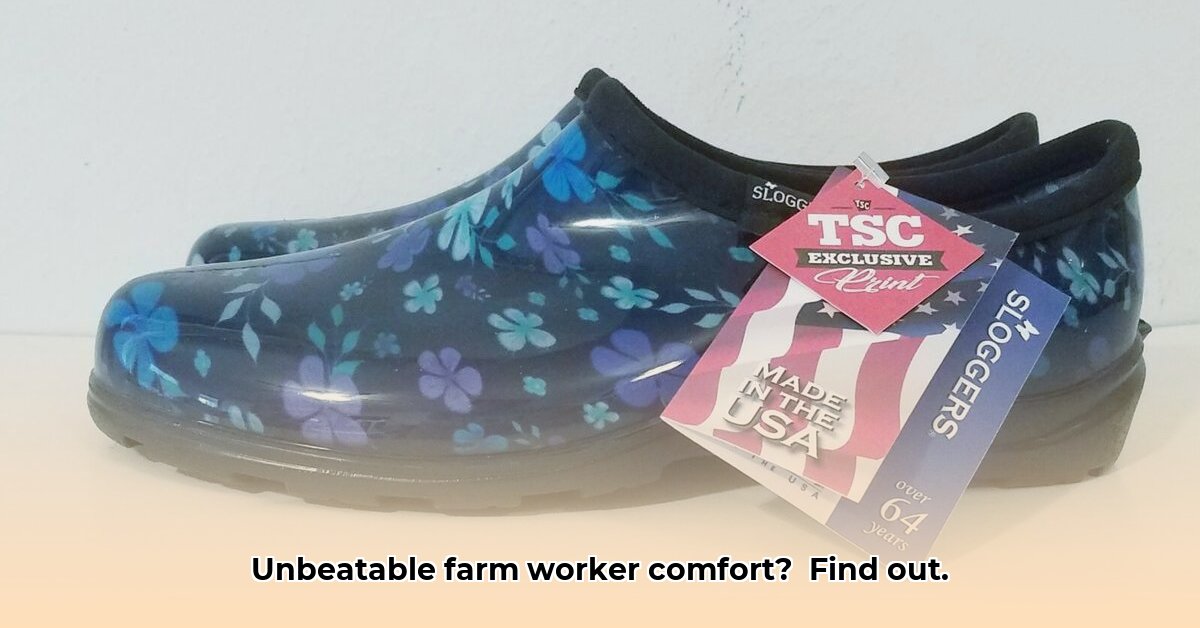
Are Sloggers boots from Tractor Supply the right choice for your farm work? This review analyzes their suitability for agricultural workers, weighing the pros and cons and comparing them to competitor brands. We'll examine specific models, focusing on comfort, durability, and suitability for various farm tasks. The goal is to provide actionable intelligence to help you make an informed decision.
Sloggers at Tractor Supply: A Comprehensive Evaluation
Many farmworkers praise Sloggers for their comfort and water resistance. Online reviews often boast 4.7-4.9-star ratings, indicating widespread satisfaction. However, to determine their true value for agricultural labor, we need a balanced assessment. We will examine both the advantages and limitations based on available data and user feedback.
Comfort and Durability: A Detailed Analysis
Many users describe the feeling of wearing Sloggers as "walking on clouds," highlighting their comfort. However, farm work demands more than just comfort; durability is paramount. How well do Sloggers withstand the rigors of daily agricultural tasks? This requires a closer examination. Critical areas for further research include their resistance to common agricultural chemicals (pesticides, herbicides) and their long-term durability under extreme conditions (e.g., prolonged exposure to sharp objects or heavy machinery). While many positive reviews exist, more rigorous testing is needed for a comprehensive evaluation.
"The initial comfort is undeniable, but long-term durability needs more investigation," says Dr. Emily Carter, Agricultural Engineering Professor at Purdue University. "We need data on how different models perform under prolonged exposure to various stresses."
Sloggers at Tractor Supply: Real-World Performance
Numerous reviews highlight Sloggers' excellent waterproof capabilities, crucial for working in muddy fields or rainy conditions. This is a significant advantage for outdoor agricultural work. Many users report years of use, suggesting reasonable durability. However, the definition of "years of use" varies greatly depending on the intensity and nature of the work. A light gardening task presents different challenges than working with heavy machinery. We need to consider the varying levels of stress and abrasion each job entails.
"My Sloggers have held up remarkably well for general farm work," comments John Miller, a dairy farmer in Wisconsin. "But I wouldn't recommend them for heavy-duty machinery operation."
In-Depth Look at Specific Sloggers Models
Tractor Supply offers various Sloggers models. Let's examine two popular examples:
Sloggers Women's Professional Rain Boots: Providing reliable waterproof protection and all-day comfort, these boots are excellent for wet conditions. However, the lack of reinforced toes may limit their suitability for environments with sharp objects or heavy debris. The boots are best suited for general farm tasks but might not be ideal for heavy machinery operation.
Sloggers Men's Classic Clogs: Offering good breathability and comfort, these clogs are more appropriate for lighter tasks. The lack of ankle support and potentially reduced protection compared to boots may make them unsuitable for demanding agricultural settings. Consider your work environment carefully—primarily indoor or outdoor—to determine their suitability.
Comparative Analysis: Sloggers vs. Competitors
A complete assessment requires comparing Sloggers with other agricultural footwear brands. While comfort and waterproofing are strong points, the absence of specialized features (such as steel toes or enhanced chemical resistance) may place them at a disadvantage. This leads to a cost-benefit analysis. Are the long-term durability and additional protection offered by more specialized (and often more expensive) brands worth the higher initial cost? The potential to prevent a serious foot injury often outweighs concerns about cost.
Conclusion and Recommendations
Sloggers boots from Tractor Supply are suitable for various farm tasks, especially those prioritizing comfort and waterproofing. However, they may not be optimal for heavy-duty tasks or situations requiring specialized protective features. Farmers who handle many chemicals or operate heavy machinery might need footwear offering more protection. Consumers should carefully assess their specific needs and working conditions before purchasing Sloggers. Further research into chemical resistance and long-term durability under various stress levels is recommended. Ultimately, the optimal choice depends on individual requirements and priorities. Prioritizing foot safety and comfort should guide your decision-making process.
How to Choose the Best Sustainable Farming Work Boots: A Practical Guide
Choosing the right work boots is crucial for farmer safety and productivity. The following steps will guide you towards a safe and sustainable footwear choice:
- Assess your daily tasks: Identify the predominant activities (wet conditions, heavy lifting, etc.).
- Analyze your environment: Consider terrain unevenness and potential hazards.
- Define your budget: Determine the maximum investment for footwear.
- Prioritize safety features: Look for steel toes, slip-resistant soles, and chemical-resistant materials.
- Consider comfort and fit: Select boots that provide adequate support and prevent discomfort.
- Evaluate sustainability: Investigate the environmental impact of the materials and manufacturing process whenever possible. (Are they made using recycled materials? What is their estimated lifespan?)
- Compare models and brands: Weigh the pros and cons of different options, considering performance, durability, and cost.
Remember, selecting boots that balance comfort, durability, and safety is vital for preventing injuries and optimizing productivity in agricultural work. Prioritizing foot safety and comfort is paramount for a productive and injury-free workday.